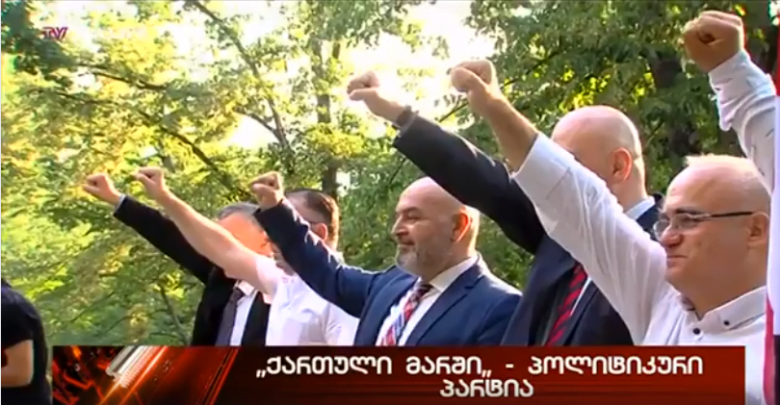
Nativist ‘Georgian March’ Movement Becomes Political Party
The ultranationalist, nativist movement Georgian March became a political party following its constituent congress on July 2.
Sandro Bregadze, newly elected chairman of the new party, said that the party ideology will be based on the “Homeland, Language and Faith” formula – voiced in the early writings of Ilia Chavchavadze, a writer and lawyer who led Georgian liberal nationalism project against Tsarist Russia in late 19th century.
To mark the point, the Congress was held at Ilia Chavchavadze Museum in Saguramo, some 30 kilometers north to the capital, Tbilisi.
Irakli Shikhiashvili, a former member of the ruling Georgian Dream party and former chairman of the Tbilisi City Council, was elected as the party’s secretary-general. The party plans to run in the October parliamentary elections, and its leaders aim at setting up a faction in the new Parliament.
Leaders of the newly set up political force have named the opposition United National Movement and European Georgia parties as their key opponents.
Giorgi Gigauri, member of the political council of the Georgian March, said “the UNM and its cluster are preparing for the revolution and Georgian March will not allow them to achieve it.”
Venue controversy
Associating the Georgian March party congress with Ilia Chavchavadze is highly controversial. Count Chavchavadze, one of the fathers of Georgian liberal nationalism, is a public figure revered for his prose, struggle against Russian imperialism, and innovative efforts to establish newspapers, a bank, being an active leader of the society for spreading literacy. He died at the hands of Bolshevik conspirators and was sanctified by the Georgian Orthodox Church.
Appropriation of Chavchavadze’s name by a radical nationalist force triggered mixed reactions among Georgian Facebook netizens, who said the state museum should have never allowed the event to take place.
In response to their discontent, museum director Andro Bedukadze said the museum “is a public space” that seeks to secure additional funds via renting its space to interested parties regardless of their political ideologies. Bedukadze said Georgian March paid GEL 3,000 (USD 960) to the museum in exchange for holding a two-hour event.
Ascent of the Georgian March
The movement of Georgian March, uniting various ultranationalist groups, was established in 2017. In July 2017, around 2000 protesters held the “March of the Georgians” rally on the Aghmashenebeli Avenue in Downtown Tbilisi, demanding the deportation of illegal immigrants, toughening the immigration law, imposing restrictions on granting residence permits to foreigners and banning foreign funding to civil society organizations.
Bregadze, who led the Erovnulebi (Georgian for “the nationally minded”) movement back then, issued an ultimatum “to all illegal immigrants” in his announcement of the rally, calling on “Iranians, Arabs, Africans, and others” to leave Georgia.
Since then, Georgian March organized a number of violent rallies, with the radical groups assaulting and physically insulting citizens with different political views and sexual orientation.
- Hate Groups Out to Disrupt Gay-themed Film Premiere
- Police Investigates Georgian March Leader over Influencing Public Defender
Georgian March and its leader Sandro Bregadze, together with other hate groups, organized rallies outside Amirani Cinema against Tbilisi premiere of “And Then We Danced”, a Georgian-Swedish film with gay protagonists, in November 2019. The police then detained 11 persons for disobeying police orders and hooliganism.
Bregadze served as Deputy Minister for Diaspora Issues under Georgian Dream administration in 2014-2016. Prior to that, Bregadze held the position of Deputy Minister of Internally Displaced Persons from the Occupied Territories.
In the wake of his political career, Bregadze was a member of the Democratic Revival Union party of Aslan Abashidze, feudal renegade ruler of Georgia’s Adjara region. The party disbanded soon after Abashidze fled to Moscow in May 2004.
According to Ifact Georgia, a group of investigative journalists, relatives of Sandro Bregadze, the leader of Georgian March, donated GEL 85,000 to the Georgian Dream party in the pre-election period in 2016.
Georgian March also appeared in the report released by the Estonian Foreign Intelligence Service (EFIS) in February. According to the document, several leaders of the Georgian March had ties to Russia and amplify the Kremlin’s “influence activities.”
This post is also available in: ქართული Русский